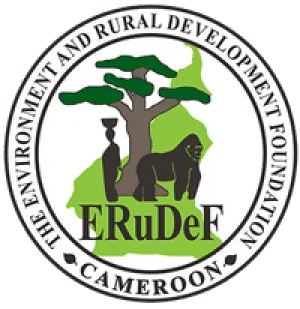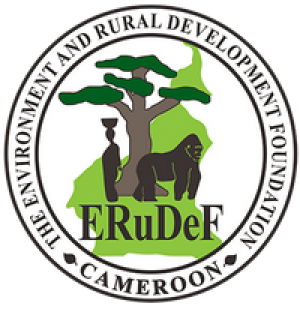Thanks to the exceptional richness of its forest ecosystems, the Lebialem Highlands- particularly the Tofala-Mone East corridor is well known for its rich biodiversity.
With technical support from the African Conservation Foundation (ACF) and other partners, Environment and Rural Development Foundation (ERuDeF) in 2003, launched a long-term research and conservation programme for the protection of biodiversity in the Lebialem Highlands. This research led to the discovery of Cross River gorillas and the Nigeria-Cameroon chimpanzees in this landscape in 2004. Continued research in 2010 led to the creation of the Lebialem Highlands Conservation Complex with the Tofala-Mone East Corridor constituting one of the conservation blocks.
Since 2010 through the bio-monitoring research, over 150 chimpanzees, about 15-20 gorillas, unknown population of buffaloes, drills, water chevrotain and other endangered species of fauna and flora have been recorded in this rainforest corridor. The Tofala-Mone corridor serves as a genetic corridor, linking the Cross River gorillas of the Tofala Hill Wildlife Sanctuary (THWS) to those of the Takamanda National park through the Mone Forest Reserve. Over a 4 year period, from 2008 through 2012, the (ERuDeF) has conducted regular annual biodiversity surveys in this corridor that led to its proposal as a wildlife genetic corridor in 2010.
Despite the deforestation rate in this corridor, before the year 2016, being lower, it has increased at an alarming rate from 2016 to present due to the crisis plaguing the two English speaking Regions. In North West and South West people continue to relocate to bushes, establishing new settlements and farming areas. The widespread clearing of forests for subsistence agriculture and the cultivation of cocoa, palms is an equally alerting trend.
As these regions of the country faces above mounting threats, a promising alternative has emerged: the creation of community forests to be managed by local communities across the landscape, where ERuDeF has a long history of collaborating with local communities. Community forests can outperform strict protected areas when it comes to maintaining forest cover, while also providing economic development opportunities for marginalized groups.
Fifteen communities i.e Bakumba, Ayukaba, Chinda, Numba, Kendem, Bokwa, Etoko, Egbemo, Tafu, Fumbe, Bambat, Egumbu, Banti, Folepi, Bechati and Sabes live within this forest corridor and depend on it for about 90% of their survival as confirmed by ERuDeF socio-economic surveys. Based on the importance of this rainforest block, local communities applied to the state of Cameroon through ERuDeF to aid them in conserving this rich rainforest through the creation of a series of community forests.
With financial support from international partners such as the Waterloo Foundation, New England Biolabs, Rainforest Trust and technical support from the African Conservation Foundation, the Ministry of Forestry and Wildlife, four community forests of 15,402 hectares have been created between 2016 to 2019. This creation, combined with a community and municipal collaborative management approach, has led to the development of economic opportunities through the implementation of a local soap making enterprise in this corridor for long term conservation of biodiversity in these forests. These community forests are Bakumba-Ayukaba-Numba-Chinda-Kendem (BANCK), Bokwa-Etoko-Egbemo-Tafu (BEET), Kendem-Etoko-Bokwa, and Leujie community forests. Three of these community forests i.e BANCK, BEET and KEB, are located between the Forest Management Unit (FMU) 11-002 and the Mone River Forest Reserve in Upper Banyang Sub-Division of Manyu Division, South West Cameroon, while the Leujie community forest is located between the Tofala Hill Wildlife Sanctuary and the FMU 11-002 and cuts across Lebialem and Manyu Divisions. Ten thousand (10,000) forest- dependent people, in 15 communities adjacent to these community forests, will benefit from the support of this project. Like most forest-dependent groups, these communities possess tremendous knowledge of biodiversity. Their harvesting of forest products- be it for domestic consumption or trade, generates critical household income and provides them with the opportunity for sustainable economic growth. The project with the forest communities, is now being carried forward with other funding mechanisms to provide continuity, and ensure that promising results can be consolidated.
This project will benefit 15 communities that are home to a total of approximately 10,000 individuals. We have collaborated with these communities to lay the groundwork for the conservation of endangered species of fauna and flora, while strengthening their internal governance and enabling them to operate in a competitive market environment. Additionally, we have facilitated the establishment of one local community-owned forest enterprise as a tool for pooling investments in equipment and social infrastructure, increasing negotiating power and improving access to markets. This work has been carried out in a participatory manner.
The creation of 4 community forests has resulted in the protection of over 45,000ha of pristine forest between the Tofala Hill Wildlife Sanctuary and the Mone Forest Reserve. This will contribute towards the long term protection of the over 630,000 ha in the Lebialem Highlands Complex.
The reliance and pressure on biological resources and the ecosystem has reduced through income generation; new employment opportunities for youths, trappers and others who are involved in forest habitat destruction and species extinction.
The local community stakeholders’ awareness and commitment to conserve the Tofala-Mone East Corridor and its threatened biodiversity has increased by at least 70%.

